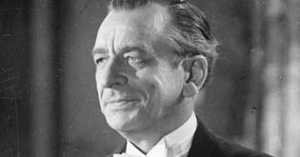Gallery
All Pictures (5)Biography
Kurt Walter Goetz, born November 17, 1888, in Mainz, was known as theatre and movie director, writer, and actor. His stepfather supported his musical talent from an early age on. After graduating from school at the age of 18, Goetz took cello lessons and attended acting lessons from the famous Berlin-based actor Emanuel Reicher. In 1907, Curt Goetz made his stage debut at Stadttheater Rostock. In Rostock, he also wrote his first sketches for the stage. Goetz then played at theatres in Nuremberg and Berlin. From 1911 on, Goetz started to write comic one-act plays, grotesques, and boulevard theatre plays, "satirizing the Philistines' double standards with his finely honed wit" (CineGraph), and became one of the leading German writers for boulevard theatre comedies. Besides his work as a writer, Goetz who by that time called himself Curt (with a "C") appeared as an actor in numerous theatre productions.
Goetz made his movie debut in 1912 as a murderer in Harry Piel's "Schwarzes Blut". Besides his work as a film actor (most often as the villain in crime movies and dramas), Goetz, sometimes pseudonomously, wrote screen plays for crime films. He for instance created the three-part detective and adventure series "Fantasie des Aristide Caré" (1918) and himself played three parts in the segment "Die drei van Hells". In 1922, he founded his own production company "Kurt Götz-Film-Compagnie GmbH" to make his own films as a director, such as the ambitious biopic "Friedrich Schiller – Eine Dichterjugend". Although Goetz received benevolent reviews for his debut as a director and he still was a successful movie actor, Goetz withdrew from the film business only a little later.
Goetz who had already been married from 1912 to 1917, married the actress Valérie von Martens in 1923. In 1927, he founded his own ensemble and took it on a successful tour with his own plays. In 1930, the first play by Curt Goetz, the enormously popular comedy "Hokuspokus" ("Hocuspocus"), was adapted for the movie screen. Subsequently, Goetz became interested in the film business again and co-wrote the comedies "Glückskinder" ("Lucky Kids") and "Sieben Ohrfeigen" ("Seven Slaps", both 1937), starring Lilian Harvey and Willy Fritsch. In 1938, Goetz made his second film as a director, the satirical comedy "Napoleon ist an allem Schuld".
One year later, Goetz and his wife Martens emigrated to the United States where Goetz worked as an author of MGM studios for the successful film "Two Faced Woman", starring Greta Garbo, but turned down the offer for a five-year contract. Instead, he and his wife bought a chicken farm in Van Nuys, California, and started to breed chickens. But during that time, Goetz also wrote the satirical and ironical novel "Die Tote von Beverly Hills" ("Dead Woman from Beverly Hills"), as well as a new, Americanized version of "Hokuspokus", and a reworking of his play "Das Haus in Montevideo" , which was shown on Broadway under the title "It's a Gift" with Goetz and Martens in the leading roles.
In 1946, the Goetz couple returned to Europe – but went to Switzerland instead of Germany. In the following years, Goetz made a number of successful movies. The medical satire "Dr. med. Hiob Prätorius" ("Praetorius", 1949) became so popular that the production of an American remake started only one year later, with Geotz participating in the remake. Movie versions of "Das Haus in Montevideo" ("The House in Montevideo", 1951) and "Hokuspokus" ("Hocuspocus", 1953, directed by Kurt Hoffmann) also became box office hits. In his play "Nichts Neues in Hollywood" (1956) Goetz remembered his years in the United States in a satirical way. His style of putting together eloquently polished dialogues and scenes to a fast-paced film is quite a match to the genre of American "screwball comedies".
In 1958, Goetz became a member of Berlin's Akademie der Künste. A little later, Goetz withdrew from his professional life for health reasons. On September 12, 1960, Curt Goetz died in the Swiss town of Grabs. Three years later, his wife Valérie von Martens published her memoirs "Wir wandern, wir wandern...".
